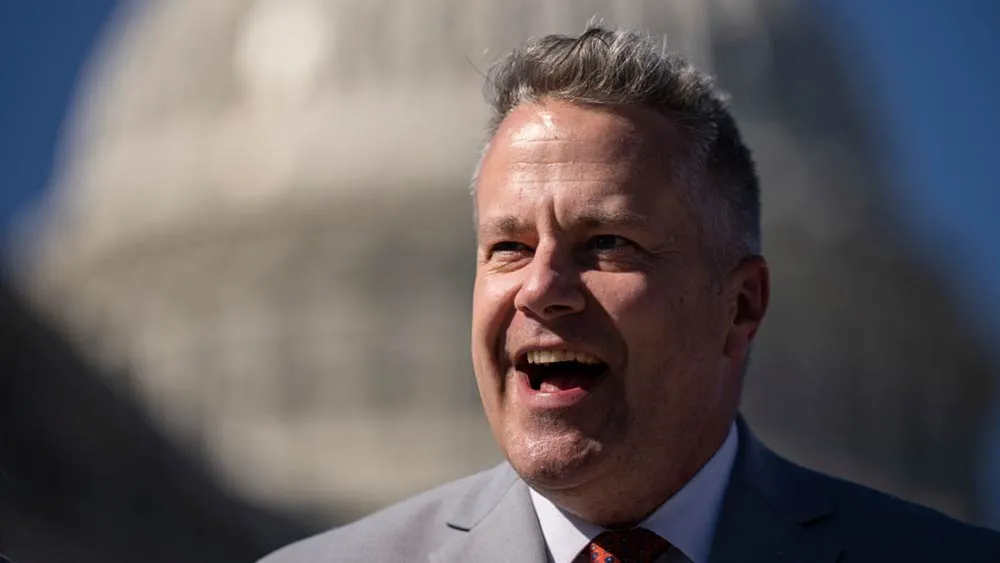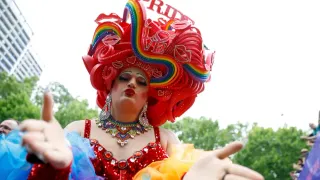March 7, 2021
Where IS Ruled, Pope Calls on Christians to Forgive, Rebuild
Nicole Winfield and Samya Kullab READ TIME: 5 MIN.
Pope Francis urged Iraq's Christians on Sunday to forgive the injustices committed against them by Muslim extremists and to rebuild as he visited the wrecked shells of churches and met ecstatic crowds in the community's historic heartland, which was nearly erased by the Islamic State group's horrific reign.
At each stop in northern Iraq, the remnants of its Christian population turned out, jubilant, ululating, decked out in colorful dress, though heavy security prevented Francis from plunging into the crowd as he would normally do. Nonetheless, they simply seemed overjoyed that he had come and that they had not been forgotten.
It was a sign of the desperation for support among an ancient community uncertain whether it can hold on. The traditionally Christian towns dotting the Nineveh Plains of the north emptied out in 2014 as Christians – as well as many Muslims – fled the Islamic State group's onslaught. Only a few have returned to their homes since the defeat of IS in Iraq was declared four years ago, and the rest remain scattered elsewhere in Iraq or abroad.
Bells rang out in the town of Qaraqosh as the pope arrived. Speaking to a packed Church of the Immaculate Conception, Francis said "forgiveness" is a key word for Christians.
"The road to a full recovery may still be long, but I ask you, please, not to grow discouraged. What is needed is the ability to forgive, but also the courage not to give up." The Qaraqosh church has been extensively renovated after being vandalized by IS militants during their takeover of the town, making it a symbol of recovery efforts.
Iraq's Christian population, which have exited here since the time of Christ, has dwindled from around 1.5 million before the 2003 U.S.-led invasion that plunged the country into chaos to just a few hundred thousand today.
Francis's visit to Iraq, which was on its last day Sunday, aimed to encourage them to stay and help rebuild the country and restore what he called its "intricately designed carpet" of faith and ethnic groups.
Earlier Sunday, Francis, dressed in white, took to a red carpeted stage in the north's main city, Mosul, surrounded by the grey hollowed-out shells of four churches nearly destroyed in the war to oust IS fighters from the city.
It was a scene that would have been unimaginable years earlier. Mosul, Iraq's second largest city, was at the heart of the IS so-called "caliphate" and witnessed the worst of the group's rule inflicted on Muslims, Christians and others, including beheadings and mass killings.
"How cruel it is that this country, the cradle of civilization, should have been afflicted by so barbarous a blow," Francis said, "with ancient places of worship destroyed and many thousands of people – Muslims, Christians, Yazidis – who were cruelly annihilated by terrorism and others forcibly displaced or killed."
He deviated from his prepared speech to emphasize the plight of Iraq's Yazidi minority, which was subjected to mass killings, abductions and sexual slavery at the hands of IS.
"Today, however, we reaffirm our conviction that fraternity is more durable than fratricide, that hope is more powerful than hatred, that peace more powerful than war."
The square where he spoke is home to four different churches – Syriac Catholic, Armenian-Orthodox, Syriac Orthodox and Chaldean – each left in ruins.
IS inflicted atrocities against all communities, including Muslims, during its three-year rule across much of northern and western Iraq. But the Christian minority was hit especially hard. The militants forced them to choose among conversion, death or the payment of a special tax for non-Muslims. Thousands fled, leaving homes and churches that were destroyed or commandeered by the extremists.
Mosul, Iraq's second largest city, became IS's bureaucratic and financial backbone. It took a ferocious nine-month battle to finally free the city in July 2017. Between 9,000 and 11,000 civilians were killed, according to an AP investigation at the time, and the war left a swath of destruction. Many Iraqis have been left on their own to rebuild amid a years-long financial crisis.
The Rev. Raed Kallo was among the few Christians who returned to Mosul after IS was defeated. "My Muslim brothers received me after the liberation of the city with great hospitality and love," he said on stage before the pontiff.
Before IS, he had a parish of 500 Christian families. Now only 70 families remain, he said. "But today I live among 2 million Muslims who call me their Father Raed," he said.
Gutayba Aagha, the Muslim head of the Independent Social and Cultural Council for the Families of Mosul, encouraged other Christians to return.
"In the name of the council, I invite all our Christian brothers to return to this, their city, their properties and their businesses," he said.
Throughout his four-day visit, Francis has delivered a message of interreligious tolerance and fraternity to Muslim leaders, including in a historic meeting Saturday with Iraq's top Shiite cleric, Grand Ayatollah Ali al-Sistani.
But Christians say it will take real changes on the ground for them to be able to return and stay, saying they face discrimination and intimidation from Shiite militias on top of the economic hardships suffered by all Iraqis.
Qaraqosh resident Martin Auffee said he was overjoyed by the pope's visit and appreciated that he showed he was with Christians as he urged them to endure and keep up hope.
"But we don't know for how long they can cling onto hope and continue to stay in Iraq because there's a lot of pain, unemployment and uncertainty," the 27-year-old said. "My whole life has been filled with pain, misery, war, persecution and displacement. Things are difficult for those living here."
At Qaraqosh, Francis urged its residents to continue to dream, and forgive.
"Forgiveness is necessary to remain in love, to remain Christian," he said.
He spoke after a resident, Doha Sabah Abdallah, told him how her son and two other young people had been killed in a mortar strike Aug. 6, 2014 as IS was nearing the town. Their death was the alarm for the rest of the residents to flee.
"The martyrdom of these three angels was a clear warning: if it weren't for them, the people of Baghdede would have remained, and would have inevitably fallen into the hands of ISIS," she said, referring to the name of Qaraqosh used by residents. "The deaths of three saved the entire city."
She said now it was for the survivors to "try to forgive the aggressor."
Francis wrapped up the day – and his visit – with a Mass at the stadium in Irbil, in the semi-autonomous northern Kurdish region. An estimated 10,000 people erupted in ululating cheers when he arrived and did a lap around the track in his open-sided popemobile, the first and only time he has used it on this trip due to security concerns.
On the makeshift altar for the Mass was a statue of the Virgin Mary that was restored after IS militants chopped of its head and hands when they took over the ancient Assiryan town of Keramlis, near Mosul, in August 2014.
Few in the crowd wore facemasks, as was the case during all of Francis' visits Sunday in northern Iraq.
Public health experts had expressed concerns ahead of the trip that large gatherings could serve as superspreader events for the coronavirus in a country suffering from a worsening outbreak where few have been vaccinated. The pope and members of his delegation have been vaccinated but most Iraqis have not.
___
Kullab reported from Baghdad. AP Religion Correspondent Mariam Fam contributed.







